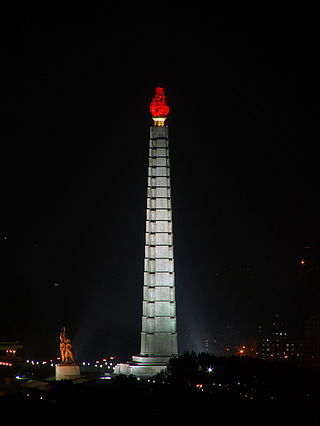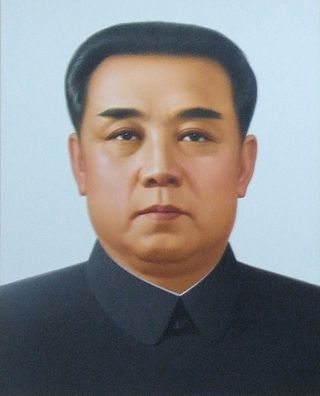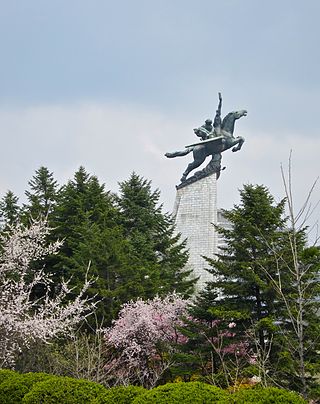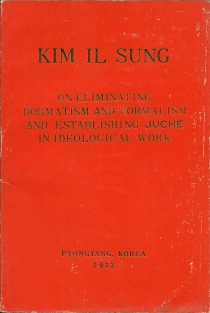| |||||
| Centuries: | |||||
|---|---|---|---|---|---|
| Decades: | |||||
| See also: | Other events in 1955 Years in North Korea Timeline of Korean history 1955 in South Korea | ||||
Events from the year 1955 in North Korea .
| |||||
| Centuries: | |||||
|---|---|---|---|---|---|
| Decades: | |||||
| See also: | Other events in 1955 Years in North Korea Timeline of Korean history 1955 in South Korea | ||||
Events from the year 1955 in North Korea .

The Juche Tower, completed in 1982, is a monument in Pyongyang, the capital of North Korea, and is named after the ideology of Juche introduced by the country's first leader, Kim Il Sung.

Juche, officially the Juche idea, is the state ideology of North Korea and the official ideology of the Workers' Party of Korea. North Korean sources attribute its conceptualization to Kim Il Sung, the country's founder and first leader. Juche was originally regarded as a variant of Marxism–Leninism until Kim Jong Il, Kim Il Sung's son and successor, declared it a distinct ideology in the 1970s. Kim Jong Il further developed Juche in the 1980s and 1990s by making ideological breaks from Marxism–Leninism and increasing the importance of his father's ideas.

The Down-with-Imperialism Union was allegedly founded on 17 October 1926 in Hwatian County, Kirin, China, in order to fight against Japanese imperialism and to promote Marxism–Leninism. It is considered by the Workers' Party of Korea to be its root and foundation and its creation is celebrated every year.

The Socialist Constitution of the Democratic People's Republic of Korea is the constitution of North Korea. It was approved by the 6th Supreme People's Assembly at its first session on 27 December 1972, and has been amended and supplemented in 1998, 2009, 2012, 2013, 2016, 2019 (twice), 2023 and 2024. It replaced the country's first constitution which was approved in 1948.

The eternal leaders of North Korea are mentions of deceased leaders of North Korea. The phrase was mentioned in a line of the preamble to the Constitution, as amended on 30 June 2016, and in subsequent revisions.
Baik Bong (Korean: 백봉) is a North Korean author known for writing the official biography of Kim Il Sung.
The Communist movement in Korea emerged as a political movement in the early 20th century. Although the movement had a minor role in pre-war politics, the division between the communist North Korea and the anti-communist South Korea came to dominate Korean political life in the post-World War II era. North Korea, officially the Democratic People's Republic of Korea, continues to be a Jucheist state under the rule of the Workers' Party of Korea. In South Korea, the National Security Law has been used to criminalize advocacy of communism and groups suspected of alignment with North Korea. Due to the end of economic aid from the Soviet Union after its dissolution in 1991, the impractical ideological application of Stalinist policies in North Korea over years of economic slowdown in the 1980s, and the recession and famine during the 1990s, North Korea has replaced Marxism-Leninism with the Juche idea despite nominally upholding Communism. References to Communism were removed in the North Korean 1992 and 1998 constitutional revisions to make way for the personality cult of Kim's family dictatorship and the North Korean market economy reform. The Workers' Party of Korea under the leadership of Kim Jong Un later reconfirmed commitment to the establishment of a communist society, but orthodox Marxism has since been largely tabled in favor of "Socialism in our style". Officially, the DPRK still retains a command economy with complete state control of industry and agriculture. North Korea maintains collectivized farms and state-funded education and healthcare.

Kim Il Sung Square is a large city square in the Central District of Pyongyang, North Korea, and is named after the country's founding leader, Kim Il Sung. The square was constructed in 1954 according to a master plan for reconstructing the capital after the destruction of the Korean War. It was opened in August 1954. The square is located on the foot of the Namsan Hill, west bank of the Taedong River, directly opposite the Juche Tower on the other side of the river. It is the 37th largest square in the world, having an area of about 75,000 square metres which can accommodate a rally of more than 100,000 people. The square has a great cultural significance, as it is a common gathering place for concerts, rallies, dances and military parades and is often featured in media concerning North Korea.

The Workers' Party of Korea (WPK), also called the Korean Workers' Party (KWP), is the sole ruling party of the Democratic People's Republic of Korea, commonly known as North Korea. Founded in 1949 from a merger between the Workers' Party of North Korea and the Workers' Party of South Korea, the WPK is the oldest active party in Korea. It also controls the Korean People's Army, North Korea's armed forces. The WPK is the largest party represented in the Supreme People's Assembly and coexists with two other legal parties that are completely subservient to the WPK and must accept the WPK's "leading role" as a condition of their existence. The WPK is banned in the Republic of Korea under the National Security Act and is sanctioned by the United Nations, the European Union, Australia, and the United States.

Kim Il Sung was a North Korean politician, revolutionary, and military leader. He founded the Democratic People's Republic of Korea, commonly known as North Korea, which he led as Supreme Leader from its establishment in 1948 until his death in 1994. Afterwards, he was succeeded by his son Kim Jong Il and was declared Eternal President.

The Juche calendar, named after the Juche ideology, is the system of year-numbering used in North Korea. It begins with the birth of Kim Il Sung, the founder of North Korea. His birth year, 1912 in the Gregorian calendar, is "Juche 1" in the Juche calendar. The calendar was adopted in 1997, three years after the death of Kim Il Sung.

The Grand People's Study House is the central library located in the North Korean capital, Pyongyang. The building is situated on Kim Il Sung Square by the banks of the Taedong River.

The North Korean cult of personality surrounding the Kim family has existed in North Korea for decades and can be found in many examples of North Korean culture. Although not acknowledged by the North Korean government, many defectors and Western visitors state there are often stiff penalties for those who criticize or do not show "proper" respect for the former leaders of the country, Kim Il Sung and Kim Jong Il, officially referred to as "eternal leaders of Korea". The personality cult began soon after Kim Il Sung took power in 1948, and was greatly expanded after his death in 1994.

Kim Il Sung was the leader of North Korea for 46 years, from its establishment in 1948 until his death in 1994.

On the Art of the Cinema is a 1973 treatise by the North Korean leader Kim Jong Il. It is considered the most authoritative work on North Korean filmmaking.

On the Juche Idea is a treatise attributed to North Korean leader Kim Jong Il on the North Korean Juche ideology. It is considered the most authoritative work on Juche.

The Chollima Statue (Korean: 천리마동상) is a monument on Mansu Hill in Pyongyang, the capital of North Korea. The monument symbolizes the "Chollima speed" of the Chollima Movement. The legendary winged horse Chollima depicted by the monument is said to travel 1,000 ri (400 km) a day.

The Juche-class are a pair of 4-car electric multiple units built by the Kim Chong-t'ae Electric Locomotive Works in 1978 and 1982, intended for service on the Korean State Railway.

On Eliminating Dogmatism and Formalism and Establishing Juche in Ideological Work, also known as the "Juche speech", was a speech delivered on 28 December 1955 by Kim Il Sung. The address mentioned his Juche ideology by name for the first time. It is considered one of Kim's most important works and a "watershed moment" in North Korean history. Views differ if the speech used the term juche to launch an ideology or more conservatively to assert that the Korean people were the subject of the revolution. The former believes that Juche, as a distinct ideology, was developed by Hwang Jang-yop on his re-discovery of the speech. The speech was published for the first time in 1960 and in many subsequent, heavily edited revisions since.

Officially, the Workers' Party of Korea (WPK) – the ruling party of North Korea – is a communist party guided by Kimilsungism–Kimjongilism, a synthesis of the ideas of Kim Il Sung and Kim Jong Il. The party is committed to Juche, an ideology attributed to Kim Il Sung which promotes national independence and development through the efforts of the masses. Although Juche was originally presented as the Korean interpretation of Marxism–Leninism, the party now presents it as a freestanding philosophy of Kim Il Sung. The WPK recognizes the ruling Kim family as the ultimate source of its political thought. The fourth party conference, held in 2012, amended the party rules to state that Kimilsungism–Kimjongilism was "the only guiding idea of the party". Under Kim Jong Il, who governed as chairman of the National Defence Commission, communism was steadily removed from party and state documents in favour of Songun, or military-first politics. The military, rather than the working class, was established as the base of political power. However, Kim Jong Il's successor Kim Jong Un reversed this position in 2021, replacing Songun with "people-first politics" as the party's political method and reasserting the party's commitment to communism.